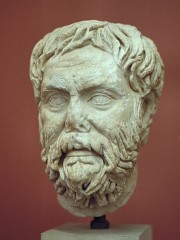|
Home
|
Apr 11, 2022
This week’s themeEponyms This week’s words pyrrhonism morphetic Rothschild roorback Hercules 
Pyrrho of Elis, 2nd century BCE
Photo: Zde / Wikimedia Previous week’s theme Words from chemistry A.Word.A.Day
with Anu GargA name labels a person, an animal, or a place. A word labels things, ideas, and concepts. Sometimes there’s cross-pollination. People are named after ideas or things, for example Charity and Pepsi (for real!), and words are coined after people. Words coined after people, we call them eponyms: from Greek epi- (upon) + -onym (name). The English language is chockful of them: boycott, dunce, and tawdry, to name a few. This week we’ll bring you five eponyms that are not as common as the above examples. These eponyms are coined after people, real and fictional. What eponyms have you coined, about yourself, your friends, colleagues, or family? Share below or email us at words@wordsmith.org. Pyrrhonism
PRONUNCIATION:
MEANING:
noun: Extreme or absolute skepticism.
ETYMOLOGY:
After Pyrrho, a Greek philosopher, c. 360-270 BCE. Earliest documented
use: 1603.
NOTES:
The philosopher and engineer Alfred Korzybski (1879-1950) once
said, “There are two ways to slide easily through life: to believe
everything or to doubt everything; both ways save us from thinking.”
Pyrrhonism would fall in the second category. The Greek philosopher
Pyrrho believed that it was impossible to be certain of any knowledge.
USAGE:
“Instead, [David Hume] recommends a more moderate or academic skepticism
that tones down Pyrrhonism.” James Fieser; David Hume; Internet Encyclopedia of Philosophy; 2022. A THOUGHT FOR TODAY:
Everyone, in some small sacred sanctuary of the self, is nuts. -Leo Rosten,
author (11 Apr 1908-1997)
|
|
Subscriber Services
Awards | Stats | Links | Privacy Policy
Contribute | Advertise
Awards | Stats | Links | Privacy Policy
Contribute | Advertise
© 1994-2025 Wordsmith